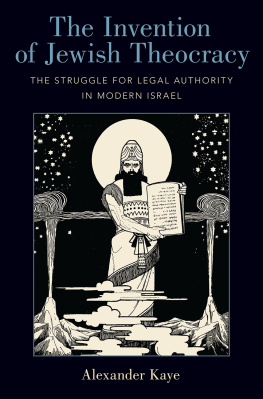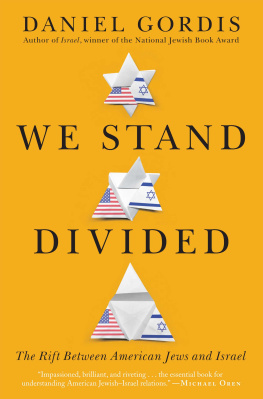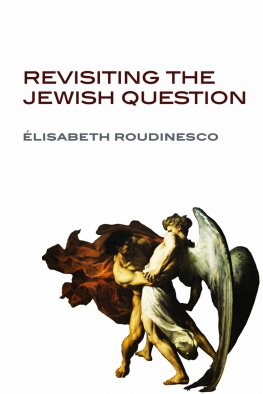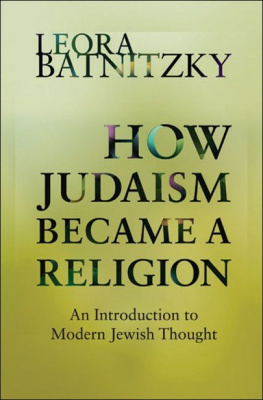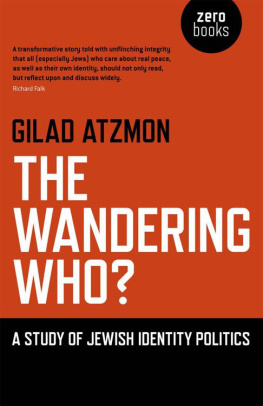The Jewish Idea and Its Enemies
First published 1988 by Transaction Publishers
Published 2019 by Routledge
2 Park Square, Milton Park, Abingdon, Oxon OX14 4RN
52 Vanderbilt Avenue, New York, NY 10017
Routledge is an imprint of the Taylor & Francis Group, an informa business
Copyright 1988 Taylor & Francis.
All rights reserved. No part of this book may be reprinted or reproduced or utilised in any form or by any electronic, mechanical, or other means, now known or hereafter invented, including photocopying and recording, or in any information storage or retrieval system, without permission in writing from the publishers.
Notice:
Product or corporate names may be trademarks or registered trademarks, and are used only for identification and explanation without intent to infringe.
Library of Congress Catalog Number: 87-13956
Library of Congress Cataloging-in-Publication Data
Alexander, Edward, 1936
The Jewish idea and its enemies.
1. JewsPolitics and government1948
2. AntisemitismHistory20th century. 3. Israel
Politics and government. 4. LebanonHistory
Israeli intervention, 1982 Foreign public
opinion. 5. Public opinion. I. Title.
DS143.A34 1987 305.8924 87-13956
ISBN 0-88738-175-8
ISBN 13: 978-0-88738-873-6 (pbk)
ISBN 13: 978-0-88738-175-1 (hbk)
In Memoriam Irvin Ehrenpreis
Acknowledgments
For help and suggestions of various kinds I received while writing this book, I would like to thank Leah Alexander, David M. Alexander, Avraham Balaban, David Bar-Illan, Yehuda Bauer, Maier Deshell, Emil Fackenheim, Robert B. Heilman, Erich Isaac, Rael Jean Isaac, Sholom Kahn, Shmuel Katz, Yaakov Keinan, Neal Kozodoy, Dorothea Krook, Ron Nettler, Cynthia Ozick, Marie Syrkin, and Donald W. Treadgold.
For support of my work in the form of a summer fellowship, I am grateful to the Jewish Studies Program of the University of Washington.
For typing the manuscript, I am grateful to Janice Goldstein, Sherry Laing, Ellen Polsky, and Marianna Wright.
The author gratefully acknowledges the following publishers and publications for permission to use previously published material:
- Ohio University Press: John Stuart Mill: A Post-Holocaust Retrospect, from The Victorian Experience, The Prose Writers, Richard Levine, editor, 1982.
- Jewish Chronicle , Body-Snatching in Rishon Lezion, 4 January 1985.
- Congress Monthly , Rationalizing Evil: The Journalistic Explainers, Converts in Zion, Jewish Self-Hatred, condensed reprint from vol. 53 (1, 4, 7). Copyright 1986 by American Jewish Congress. Reprinted by permission.
- MidstreamA Monthly Jewish Review: Stealing the Holocaust (November 1980); Terror at Home (August/September 1984); We Will Drive this Country Crazy (October 1984); Denis Goldberg, Jerry Falwell, and the Wise Men of Chelm (August/September 1985); Lionel Trilling (March 1983); Isaac Bashevis Singer (January 1987).
- Commentary , Operation Moses (July 1985); Liberalism and Zionism (February 1986); Shcharanskys Secret (October 1986); Off Balance (January 1987). Reprinted by permission; all rights reserved.
- Encounter , The Journalists War against Israel (September-October 1982). Americans for a Safe Israel: NBCs War in Lebanon: The Distorting Mirror (1983).
By the Jewish idea I mean nothing abstruse or original but only the familiar view that the Jews were called into existence as a people by a covenant with God that is as real and living today as it was at its inception. I will establish My covenant, says God to Abraham, between Me and thee and thy seed after thee throughout their generations for an everlasting covenant (Gen. 17:7). According to this simple and traditional idea, the Jews were chosen by God in order to achieve the universal salvation of mankind: In thy seed shall all the nations of the earth be blessed; because thou hast hearkened to my voice (Gen. 22:18). Israel has been chosen, but chosen by a God who keeps admonishing Israel to love the stranger as thyself; for you were strangers in the land of Egypt (Lev. 19:34). The chosenness of Israel, therefore, is directed toward the ultimate unity of mankind.
These simple notions would hardly require emphasis were it not for the fact that the Jews chosenness has so often been presented by their enemies as something the Jews themselves initiated for their own aggrandizement, and still more often travestied by spurious aspirants (medieval Roman divines, German Nazis, and Dutch Boers) to the title of the true Israel or chosen people who wanted to justify their domination of another people. So great is the possibility for confusion on this point that, as I note in my essay in this book, The Attack on Holocaust Studies, even so highly instructed a critic as George Steiner cannot recognize the distinction between a people chosen by God so that all the nations of the earth be blessed and a nation that chooses itself so that it may destroy several of the nations of the earth and subjugate all the rest.
The idea of the Jews as a covenanted people chosen to receive the law (Torah) is present, usually implicitly, sometimes explicitly, in many of the essays that follow. It takes the form of an assumption that Jewish life can lead somewhere only so long as Jews remember that it began somewhere. At Sinai (or Horeb) God made his covenant, not only with our fathers, but with us, even us, who are all of us here alive this day (Deut. 5:3). According to this doctrine, further elaborated in a psalm and a midrash, every Jew, no matter in what valley of dry bones he finds himself, whether the Gehenna of Hitlers Europe or the atheistic wilderness of the Soviet Union, was present in the imagination of those with whom the covenant was originally made. No matter how deaf Jews may have become, the voice from Sinai continues to sound and is forever available to those who can put away their idolatries and respond, as they did when Joshua enjoined them to choose to be chosen: Now therefore put away the strange gods which are among you, and incline your heart unto the Lord. And the people said unto Joshua: The Lord our God will we serve, and unto His voice will we hearken (Josh. 24:2324).
The Jewish idea of chosenness is inseparable from the belief in a divinely revealed moral code. Thou shalt have no other gods before me (Deut. 5:7) prohibits idolatry not merely in the worship of graven images but in the worship of ones own mind. Systems of morality that originate in the human mind (or in human minds gathered together in social science congresses) can never raise man one inch above his earthly level for the simple reason that in morals as in physics the stream cannot rise higher than its source. The coolness with which the Enlightenment, in both its gentile and Jewish forms, is treated in some of the essays in this collection, derives from the conviction that Moses Mendelssohn and other enlighteners undermined the idea of chosenness by making Judaism the religion of reason, thereby depriving the moral law of its efficacy by reducing it to the level of secular philosophy. Delighted with the Enlightenments promise to grant them everything as individuals but nothing as a nation, many Jews quickly forgot that it was only as a nation that they could be a light of the nations (Isa. 42:6).
The uneasy relation between Enlightenment liberalism and Jewish collective existence is explored in several of the essays in this collection, starting with the least Jewish and most personal of them all, that on John Stuart Mill, the greatest of nineteenth-century liberals, which I have included as a kind of preamble. The theme of antagonism between progressive ideologies and Jewish interests and beliefs is further developed in the portraits of Lionel Trilling and Isaac Bashevis Singer and in the more polemical essays on Liberalism and Zionism and Jewish Anti-Semitism, Enlightenment Evenhandedness, and the Arab-Israeli Conflict.



